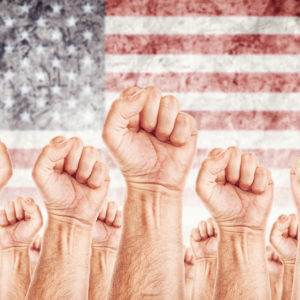Take a good look when someone says “unions aren’t needed anymore.” Is it a representative of a think tank financed by Big Business? Some corporate executive whose place in the 1 percent is secure?
Working people know better. We know that the American Dream isn’t only for Wall Street bankers and the 1 percent. It’s for all of us who want to improve our standard of living and help our children and grandchildren have even better lives. Unions enable working people to make our workplaces safer and to negotiate just wages and working conditions. Unions are how working people can earn a good living and have a better life.
We have a huge income inequality problem in our country today. There hasn’t been such a concentration of income in the hands of the richest one-tenth of 1 percent of America since 1928, just before the Great Depression. How do we turn this around? We go back to what works, and that’s enabling working people to stand together, to join a union and negotiate for a better life.
Thanks to the New Deal, unions lifted millions of families out of poverty and into the middle class. Unions helped the economy grow from weakness to strength, making the American economy the envy of the world.
For decades afterward, the wages of working people and productivity rose together, because workers were able to negotiate with management for better conditions. But since the 1970s, the gains from worker productivity started going mainly into the pockets of corporations and Wall Street investors. The overwhelming majority of working families haven’t seen an increase in real wages for nearly four decades. Some try to dispute this fact, claiming that average wages across the entire workforce have gone up. For high-end earners, sure they have. But for the rest of us — the bottom 80 percent of wage earners, the average working person — real wages are flat and declining.
Since the 1980s, there has been an aggressive attack on the right of working people to have a union. That attack, waged by the U.S. Chamber of Commerce, some powerful employers and their political allies, first focused on private-sector workers, then on public-sector workers. Without the ability to come together and negotiate collectively, millions of U.S. workers have no way to gain their fair share of a company’s profits. Many companies think that’s just fine, leaving more for corporate executives, stock buybacks and offshore foreign accounts. That’s the source of our growing income inequality.
Management routinely fires workers who want a union. Supervisors call mandatory meetings to issue threats about what will happen if workers choose a union. Some employers send high-level executives to camp out at workplaces to intimidate workers. For some companies, stopping workers from joining together in a union is more important than almost anything.
In today’s economy, Wall Street calls the shots. The 1 percent is booming. Between 2009 and 2012, the top 1 percent received 95 percent of all income gains following the Great Recession, a downturn caused by Wall Street greed. Most working families still haven’t recovered from the 11.6 percent drop in real income they faced in the Great Recession. Many now face more hardships, including sky-high student loan debt, health care costs and the fallout from bad trade deals that send even more jobs overseas.
We’re not looking to shut down Wall Street. We are looking to restore fairness to an economic and financial system that’s been one-sided for way too long. And unions, today as much as ever, are the only effective force against rampant corporate greed.
Most of the time, working people negotiate their differences with management and both sides come together in agreement. That didn’t happen earlier this year, when members of my union were forced to take on Verizon, a Fortune 15 company with monthly profits in excess of $1 billion. This very wealthy company was insisting on slashing workers’ benefits and closing call centers in the United States, to send more jobs overseas. The 39,000 working men and women and their families took a stand and went on strike for seven weeks. It was a real hardship. But we knew what we were fighting for, and in the end, we prevailed, with Verizon agreeing to keep call centers open and add more jobs.
That couldn’t have happened if Verizon workers didn’t have a union. That’s something that benefits all working people, and that’s why unions will always be needed.

